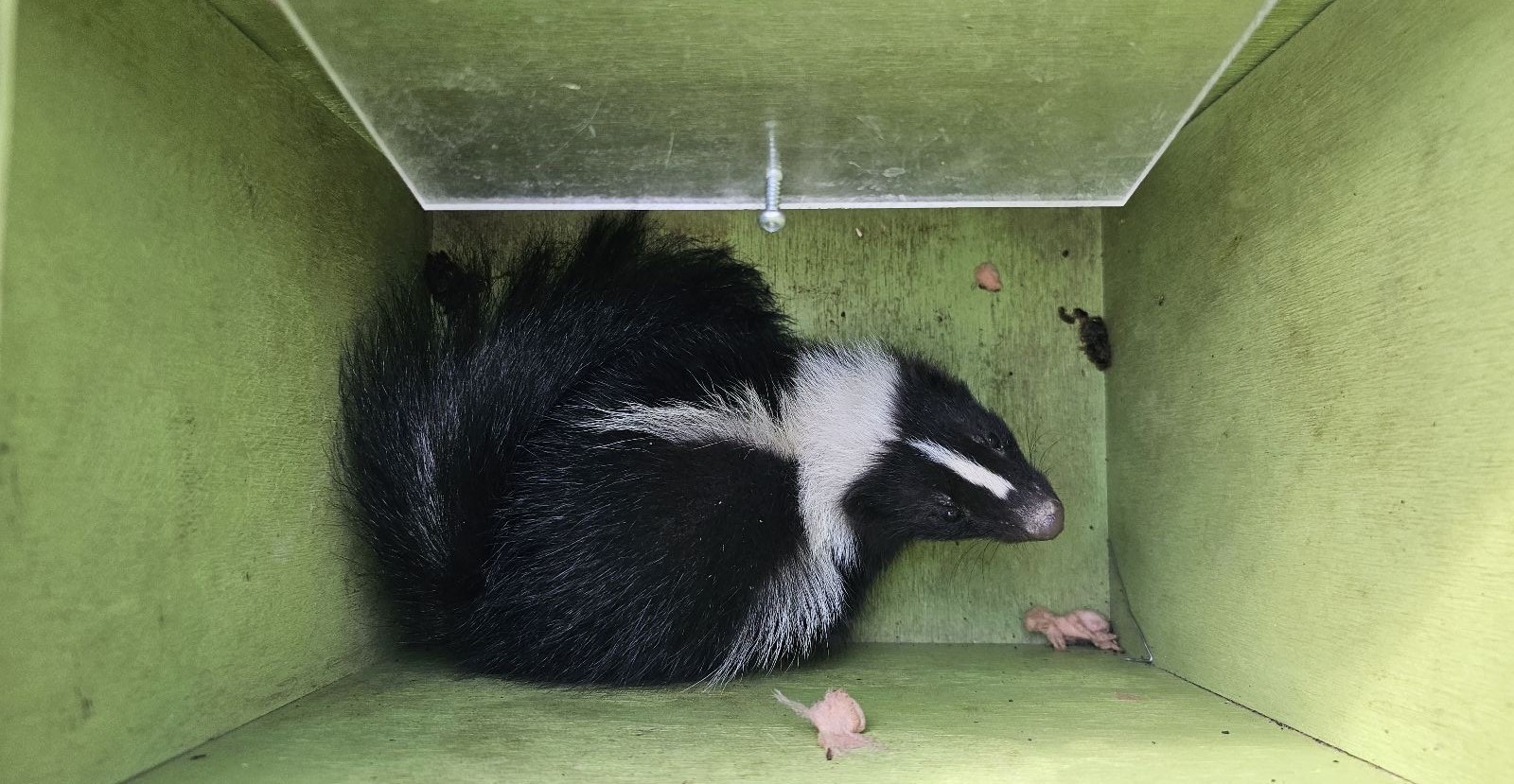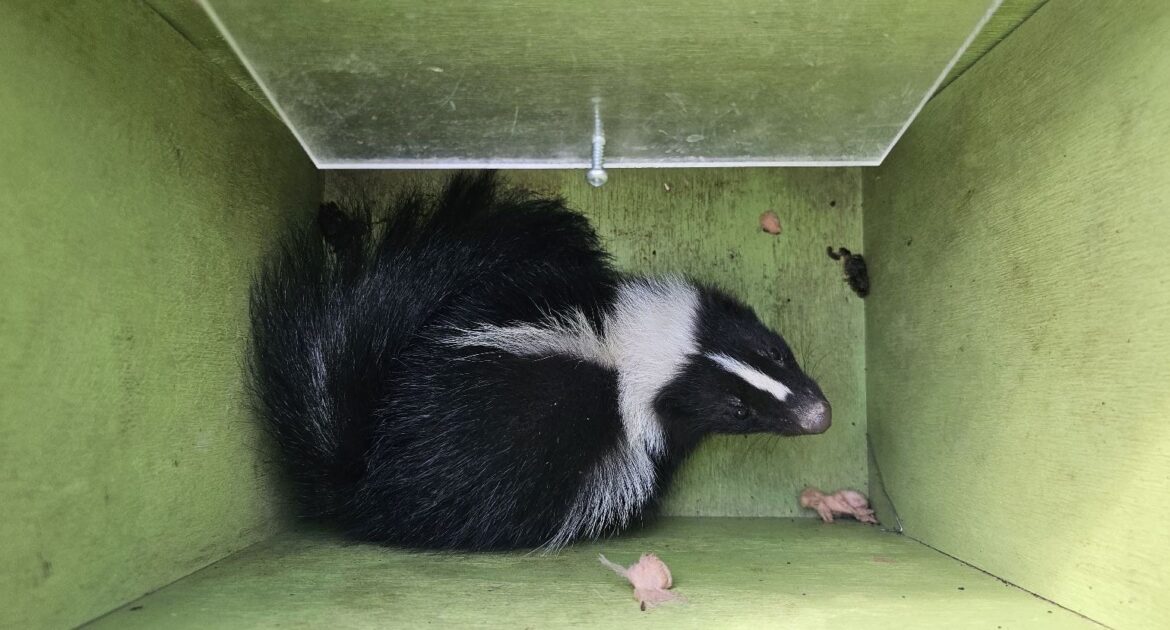Encountering a skunk unexpectedly can be a heart-stopping moment for any Coquitlam resident. The distinctive black and white striped mammal, while generally non-aggressive, carries the notorious reputation of its powerful defensive spray that can linger for weeks. Skunk encounter tips are essential knowledge for anyone living in our verdant community, where wildlife and residential areas frequently overlap. Whether you’re enjoying an evening stroll near Mundy Park or gardening in your backyard, knowing what to do if you come face to face with a skunk can save you from a smelly, uncomfortable experience that affects your home, family, and pets.
At Skedaddle Humane Wildlife Control, we’ve helped countless homeowners navigate unexpected wildlife encounters. Our over 30 years of experience with skunk behaviour and removal gives us unique insight into these misunderstood creatures. Let’s explore what you should do if you find yourself sharing space with a skunk, how to avoid getting sprayed, and preventive measures to keep them from making your property their home.
Understanding Skunk Behaviour: The Key to Safe Encounters
Before diving into what to do around skunks, it helps to understand their typical behaviour patterns. Skunks are generally docile creatures that prefer to avoid confrontation. This foundational knowledge can serve as your first line of defence.
Recognizing Warning Signs
When a skunk feels threatened, it follows a predictable sequence of warning behaviours before releasing its spray. Recognizing these signs gives you precious seconds to back away safely:
- Stamping front feet rapidly
- Raising their tail straight up
- Turning their back towards you
- Hissing or making clicking sounds
Debunking Common Skunk Myths
Understanding skunks’ real behaviour dispels several common myths and helps reduce unnecessary panic during an encounter:
- Skunks don’t spray randomly—they use it as a last resort.
- Seeing a skunk during the daytime doesn’t necessarily mean it’s rabid.
- Skunks rarely target humans intentionally.
- They can’t “aim” their spray over long distances.
Understanding these behaviours helps reduce panic during an encounter. Most importantly, remember that skunks prefer flight over fight—they’ll typically use their spray only when they feel cornered or threatened.
Immediate Actions During a Skunk Encounter
If you suddenly find yourself face-to-face with a skunk, your immediate response will determine whether you walk away unscathed or drenched in that unmistakable odour. Follow these steps for the best chance of avoiding skunk spray:
- Remain calm and freeze: Sudden movements can startle the skunk and trigger a defensive spray response. Stand still and assess the situation.
- Create distance slowly: Without turning your back, back away gradually while keeping your eyes on the skunk. Move smoothly without jerking motions.
- Speak softly: A quiet, gentle tone can help avoid startling the animal. Avoid loud noises or screaming.
- Never chase or corner: Ensure the skunk has an escape route at all times—a cornered skunk will almost certainly spray.
- Control pets immediately: If possible, call pets inside or restrain them as dogs often provoke skunk sprays by approaching too aggressively.
Important Nighttime Precautions
Since skunks are primarily nocturnal, carry a flashlight when outdoors after dusk in areas like Richmond and Coquitlam where skunk populations thrive. The light helps you spot these animals before a close encounter occurs, giving you time to change your path.
Effective Strategies for Avoiding Skunk Spray
The best defence against a skunk’s powerful spray is preparation and prevention. While encounters can happen to anyone, there are several strategies to minimize the risk:
Create a skunk-unfriendly environment:
- Store garbage in secure, wildlife-resistant containers
- Remove fallen fruit from trees promptly
- Secure compost bins with locking lids
- Eliminate potential food sources like pet food left outdoors
- Install motion-activated lights in dark areas of your property
Protective Measures for Walking at Dawn/Dusk
- Make noise as you walk to announce your presence.
- Stay on established paths where visibility is better.
- Wear closed-toe shoes during evening walks.
- Keep pets leashed during prime skunk activity hours.
We’ve observed that many Coquitlam homeowners don’t realize that grub-infested lawns are skunk magnets. These animals dig small holes in the grass, hunting for insects. Treating your lawn for grubs can significantly reduce your property’s attractiveness to skunks, especially during summer months when they’re most active.
What To Do if You or Your Pet Gets Sprayed
Despite the best precautions, sometimes the inevitable happens. If you or your pet gets sprayed by a skunk, act quickly with these steps:
For Humans:
- Remove contaminated clothing immediately and seal it in a plastic bag.
- Rinse off with cold water outdoors if possible.
- Wash thoroughly with deodorizing soap.
- Apply a specialized solution: Mix 1 quart of 3% hydrogen peroxide, ¼ cup baking soda, and 1 teaspoon liquid dish soap.
- Don’t use water initially as it can spread the oily spray and intensify the odour.
- Repeat washing as needed—it may take several treatments.
For Pets:
- Keep them outside to prevent odour transfer to home furnishings.
- Check eyes for redness or irritation—flush with cool water if affected.
- Apply the peroxide mixture described above (avoiding eyes).
- Rinse thoroughly after 20 minutes.
- Follow up with a pet-friendly shampoo.
- Consider professional grooming for severe cases.
Household Remedies That Don’t Work
- Tomato juice (only masks the smell temporarily)
- Regular shampoo alone (lacks deodorizing properties)
- Perfumes or air fresheners (combine with the odour rather than neutralize it)
Be aware that skunk spray can cause temporary nausea, eye irritation, and in rare cases, allergic reactions. If symptoms persist, seek medical attention.
Skunk-Proofing Your Property: Prevention is Key
The most effective way to avoid skunk encounters is to make your property less appealing to these animals. Skunks primarily seek shelter and food—eliminate these attractants, and they’ll generally look elsewhere.
Secure Potential Den Sites
Structures needing protection:
- Decks and porches
- Garden sheds
- Home additions without foundations
- Crawl spaces
Skunks excel at digging and can create dens by moving hundreds of pounds of soil in a short time. At Skedaddle, we install heavy-gauge steel mesh 8-12 inches deep into the ground around vulnerable structures. This professional barrier prevents skunks from digging their way under your deck or shed, providing long-term protection.
Seasonal Considerations for Skunk Prevention
Spring and early summer represent optimal times for implementing preventive measures before mother skunks establish dens for their young. Once babies arrive (typically May-June), removal becomes more complex, requiring specialized techniques to ensure the safety of both residents and the wildlife.
Summer Protection Tips:
- Inspect your property regularly for signs of digging.
- Clear brush piles and debris that could provide shelter.
- Trim vegetation near the foundation and structures.
- Apply grub control treatments to lawns.
- Secure pet food indoors, especially overnight.
When to Call Wildlife Professionals
While minor encounters can often be handled with the steps outlined above, certain situations warrant professional intervention:
Signs You Need Professional Help:
- A skunk has established a den under your structure.
- You notice a persistent skunk odour around your property.
- You observe multiple skunks, suggesting a family unit.
- There’s evidence of extensive digging along foundations or structures.
- A skunk appears disoriented, aggressive, or active during unusual hours.
At Skedaddle Humane Wildlife Control, we’re here to help you address these situations effectively and humanely. Understanding how to coexist peacefully with skunks ensures safety for everyone involved. If skunks have become a nuisance on your property, contact Skedaddle for professional assistance. Let us help you reclaim your space and peace of mind.




